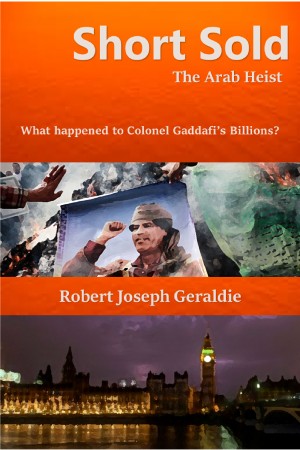Interview with Robert Joseph Geraldie
Published 2016-10-17.
What made you think of the Story?
I was on a plane, and the news at the time reported the rumblings of discontent in the Middle East and North Africa. It was clear that the ‘demand for democracy' chanted by protesters across the Arab world was a seismic threat to the neo-sultanic kleptocrats, who would hide their nations wealth deeper in the financial system. As the revolts evolved into revolutions that is exactly what happened. Dictators stashed billions into shady shell companies on hand-shake deals, actively facilitated by their bankers seated in Wall Street, the City of London, Singapore, Zurich and other trading centres.
Short Sold is a fictionalised account of one such London banker, and I wanted to tell the story from the banker’s perspective. I wanted to tell the story of the psychology of some bankers when inordinate wealth becomes loose.
You mentioned the psychology of bankers, can you extrapolate further
From the outside looking in, the bankers appear out of control. That was the core reason for the global protests targeting bankers, with the largest backlash being the Occupy Wall Street movement. But that is not true. The truth runs far deeper.
The bankers are only behaving as demanded by financial markets, which is neither unethical nor immoral – but amoral – a financial market has no conscience. Financiers behave exactly as any normal person would when their sole objective is to maximise profits, and those profits drive the functioning of nations.
Short Sold explores this considerably as a sub-plot, with each character rationalising their ‘citizenship’ to the financial market in their own unique way, or not.
In Short Sold, you mentioned the geopolitical shift towards the market-state. What do you mean by this?
In short, national governments are transitioning from democracies to market-states, and with the transition to a new political agenda, comes tremendous challenges to what those living to democratic ideals consider acceptable. We live in a world where the CEO of a multinational corporation has more power than Barak Obama does, and the hippies of the 1960’s grew into the most consumerist generation ever. Many recognise the transition, few acknowledge it, and even fewer understand what it means.
The Arab Spring provided the perfect platform to demonstrate the consequences of this clash. The peoples of the Arab world demanded democracy, but the West had transitioned to a market-state. So what is the outcome of this encounter? The leaked Hilary Clinton emails provided a glimpse into the outcome, with Colonel Gaddafi’s plan to establish the Libyan gold dinar for the sale of oil, challenging the supremacy of the dollar and the euro was a stronger cause for war than a forthcoming massacre in Benghazi.
The lead character in Short Sold, Jonathan Penney, is a citizen of the market-state, and the rules of this world are very different from what ‘the 99%’ would consider acceptable. His actions are consistent with that of a market-state ‘citizen’.
I read Short Sold and found it humorous, and at times satirical.
I didn’t want to tackle a serious subject seriously. I certainly had fun and played with my characters.
Nevertheless, the novel explores the mindset of those that understand that majority rule no longer governs nations. The novel poses questions, but not answers, allowing the reader to conclude their own truth. For as in life, there are no truths, only perceptions, biases and opinions. I crafted Short Sold to mean different things to different people, from a satire to a mirror on reality.
And you also managed to tie the plot into the narrative of quite an exciting and fast paced thriller.
I’m reluctant to call Short Sold a thriller, as I’m also reluctant to call it a crime novel. It doesn’t fit comfortably into any single genre, as it successfully draws in elements of various styles to create a unique read.
Although I have to say that with the culmination of multiple plots leading to a singular crescendo, Short Sold is certainly a racy page-turner.
Your lead character Jonathan Penney, I don’t like him one bit, he’s a brute. Yet, I couldn’t get enough of him. He’s alluring. You managed such a complex character well.
Thank you. I wanted to create Jonathan Penney to be the risque playboy in the room that everyone talks about, but nobody can keep their eyes off. He is a bit bondesque, similar to Fleming's’ original Bond, but absolutely nothing like the film adaptation. Penney’s deceptive charm and mystique attracts ladies like a tractor beam, whereas his dominance and strength draw in gentlemen envious of his success. Penney is a man of elegance and charm, but deeply flawed. Not so much due to deficiencies within his character, but due to the conflict arising from is citizenship to the market.
These characteristics of Penney allowed the perfect interplay to evolve the other characters, which – without giving away the plot – either escape the avarice of the world of high finance or spiral into the vortex of extreme greed.
Will we hear more from Jonathan Penney in the future?
Anything is on the cards.
Finally, what do you hope the reader gets from Short Sold?
If there were one thing that I hope everyone gets from the novel, it would be pleasure from a story cast from the mould of authenticity.
Smashwords Interviews are created by the profiled author or publisher.
Books by This Author
Short Sold (The Arab Heist)
by Robert Joseph Geraldie
What Happened to Colonel Gaddafi's Billions?
Set in the backdrop of the Libyan Civil War, Short Sold is a novel drawn from real events about a London banker who cannot believe his good fortune at the fall of the Gaddafi regime.

